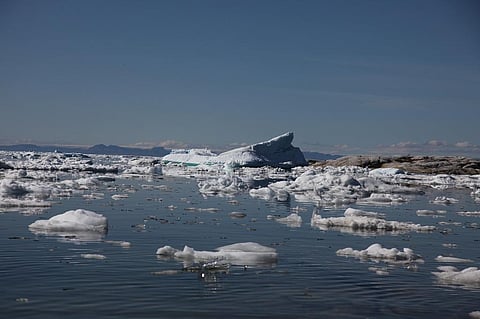

UN-mandated Paris Agreement’s target of limiting global temperature rise to 2 degrees celsius is probably insufficient to prevent an accelerated sea level rise over the next century, a new study warned.
If the global temperature rise is not kept below 1.8°C, the world could witness an “irreversible loss” of west Antarctic and Greenland ice sheets and a rapid sea level rise, the study published in Nature Communications highlighted.
Greenland and the Antarctica ice sheet will each likely contribute about 60-70 centimetres to the global mean sea level rise over the next 130 years under a high emission scenario, the findings showed.
Reaching net zero carbon emissions before 2060 is critical to avoid this catastrophe.
“The west Antarctic and Greenland ice sheets play a crucial role in future sea level rise,” Axel Timmermann, co-author of the study and director of the IBS Center for Climate Physics, told Down To Earth.
Missing the 2060 goal could cause the ice sheet to disintegrate and melt at an accelerated pace, he explained. The average global temperature has increased by slightly more than 1°C since 1880, according to the United States National Aeronautics and Space Administration.
Watch video: Highest glacier on Mt Everest is rapidly melting
Over the past century, the global mean sea level has increased by about 20 centimetres. This could be partly attributed to the thermal expansion of seawater (increase in volume due to warming oceans), glacier and ice-sheet melt and changes in groundwater storage.
The latest climate model projections presented in the sixth assessment report of the Intergovernmental Panel on Climate Change have differing views on how quickly the major ice sheets will respond to global warming, according to the study.
The team highlighted that melting ice sheets, likely the largest contributor to sea level change, are the hardest to predict as the physics governing their behaviour is complicated.
Computer models do not consider the fact that ice sheet melting has an impact on ocean processes. This, in turn, can interact with the ice sheet and the atmosphere, Jun Young Park, a graduate student and one of the study’s authors, said.
“The response of ice sheets to future climate change depends on the atmosphere and ocean warming and these factors are partly determined by what the ice sheets do,” Timmermann explained.
Capturing the two-way coupling between the different components has been challenging, he added.
So, researchers from the Republic of Korea, the US and Australia used a model that captures the interactions between ice sheets, icebergs, the ocean and the atmosphere in both hemispheres.
Their simulations showed that ice sheets’ contributions to sea level may continue to speed up even if global surface temperatures increase at a reduced rate after 2100.
By 2150, global sea level rise is estimated to rise by roughly 1.4, 0.5 and 0.2 metres under high, mid and low-emission scenarios, respectively.
The increase could be avoided under a low greenhouse gas emission scenario, with temperatures staying below 1.5 °C.
“According to our simulations, limiting 21-century global surface temperature rise to 2 °C above the pre-industrial level would be insufficient to slow the global sea level rise rate over the next 130 years,” the researchers wrote in their study.
A 2022 study warned that changing water circulation linked to climate change is probably destabilising the east Antarctic ice sheet, which is about the size of the US. The findings also underscored the need to keep global temperature rise to 1.5°C.